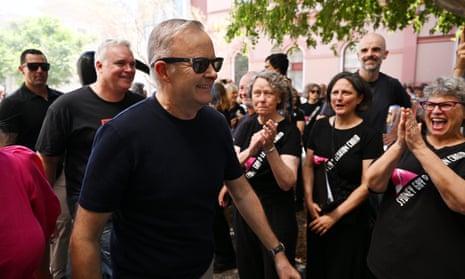Anthony Albanese will be the first sitting Australian prime minister to march in Sydney’s Gay and Lesbian Mardi Gras when he joins the parade for the WorldPride festival.
The prime minister said he will be joined by the foreign affairs minister, Penny Wong, the first openly gay woman in parliament, when he takes part in the event later in February.
“I’ll be the first prime minister not to watch the march on Mardi Gras, but to march,” he told a crowd at the official opening of Pride Square at Newtown, in Sydney’s inner west.
In 2016, Malcolm Turnbull became the first sitting prime minister to attend the Gay and Lesbian Mardi Gras, but he did not march in the parade.
Sign up for Guardian Australia’s free morning and afternoon email newsletters for your daily news roundup
That year, the then opposition leader, Bill Shorten, became the first federal leader of a major party to take part in the march.
Albanese said on Saturday his government was committed to removing inequality on the basis of sexuality or people’s identities.
“We speak a lot about tolerance – and tolerance is really important – but this is about a step that is way more important than tolerance,” he said. “We need to celebrate our diversity, not just tolerate it, because our diversity is what gives our society strength.”
Albanese paid tribute to protesters who marched for gay rights in 1978, many of whom were arrested when the first parade on Sydney’s Oxford Street was dispersed.
Since then, the annual Sydney march has grown to become part of one of the largest LGBTQI festivals in the world.
This year, 12,500 marchers are expected to take part as the parade is incorporated into the 17-day WorldPride festival.
Albanese said Australia could be “a beacon for the world”, where everyone would be respected and celebrated regardless of their beliefs, sexuality or ethnicity.
Albanese also urged those in attendance to campaign for the constitutional change to introduce an Indigenous voice to parliament, rather than merely vote “yes”.
“Speak to your neighbours, speak to your friends, speak to people in your organisations, in your community and in others and campaign to make sure that we get this done,” he said.
“Because this will be critical – it’s about how a country progresses.”
He said Australians would question why an Indigenous voice to parliament wasn’t introduced sooner after the vote, likening the upcoming referendum to the successful 2017 marriage equality vote.
“I’m very confident – just as when we got marriage equality done, people said, ‘well, why didn’t we do that earlier?’,” he said.
He said the same would be said after the voice referendum.
The referendum on enshrining an Indigenous voice to parliament in the constitution will be held in the second half of the year, while legislation to enable the vote is expected to be introduced to parliament in March.
after newsletter promotion
But Albanese’s government is facing an uphill battle to achieve bipartisan support for the change as senior Liberals continue to call for more detail on what the voice will entail.
Junior Coalition partner the Nationals oppose the voice, while the Greens’ Indigenous affairs spokeswoman, Lidia Thorpe, quit her party to pursue First Nations sovereignty as a priority instead of the voice.
The Indigenous Empowered Communities delegation, a group of 10 Indigenous people from across the country, visited Canberra this week to try and shore up support among parliamentarians for the voice.
The group’s chair, Ian Trust, said constitutional recognition through an Indigenous voice was the only pathway forward.
“Indigenous Australians have been clear they want a form of constitutional recognition which will improve practical outcomes – symbolic recognition only has been comprehensively rejected already,” he said.
“Aboriginal and Torres Strait Islander peoples want constitutional recognition to guarantee a voice.
“The status quo can no longer be tolerated.”
The deputy Liberal leader, Sussan Ley, has accused the government of placing Indigenous reconciliation at risk due to what she says is a lack of information about the voice to parliament and its structure.
The opposition leader, Peter Dutton, has called for taxpayer funds to be provided for both the official “yes” and “no” campaigns leading up to the vote.
This added expense would push the cost above the $400m budgeted for holding the referendum.
But some Liberals have broken ranks with their leader, with Senator Simon Birmingham warning against public money being spent on either campaign.
